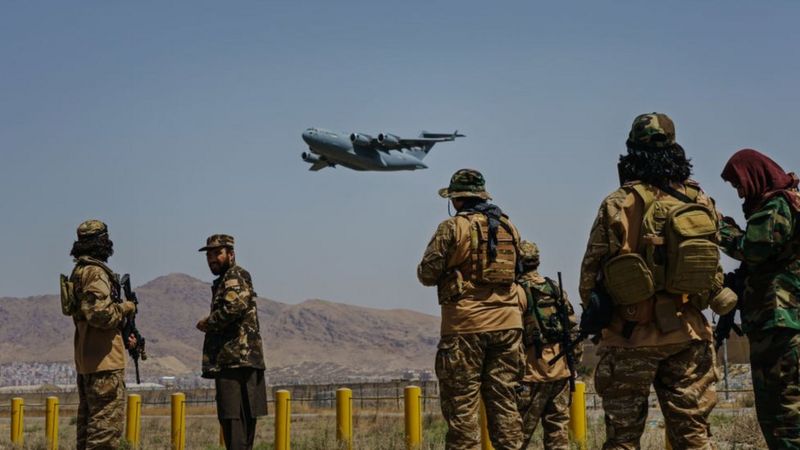Last US forces leave Afghanistan, bringing an end to a 20-year war launched in aftermath of September 11 attacks

US force leave Kabul/GETTY IMAGES
Kathmandu, 2021 August 31, Tuesday/THE INDEPENDENT
The last US forces departed from Kabul airport on Monday evening, shortly before a midnight deadline for a full withdrawal, bringing an end to a 20-year conflict launched in the aftermath of the September 11 attacks.
America’s longest war cost the lives of nearly 50,000 Afghan civilians, 2,500 US service members, 66,000 Afghan national military and police, 457 British armed forces personnel, and 50,000 Taliban and opposition fighters.
A US military aircraft takes off from the Hamid Karzai International Airport in Kabul on Monday
– AP It was a war overseen by four US presidents, fought by two generations of Americans, and at a cost of an estimated $2 trillion. It ended with the defeat of a superpower by an army of guerrilla fighters, and the collapse of a decades-long state-building project in a matter of days.
The news of the last US flight leaving Kabul came first from Taliban leaders, as celebratory gunfire echoed across the city. Soon after, General Kenneth F McKenzie of US Central Command formally announced the end of the US military presence in the country.
“I’m here to announce the completion of our withdrawal from Afghanistan and the end of the military mission to evacuate American citizens, third country nationals and vulnerable Afghans,” he said. “Every single US service member is out of Afghanistan.”
“No words from me could possibly capture the full measure of sacrifices and accomplishments of those who served,” he added.
President Joe Biden confirmed the end of the US mission in Afghanistan in a statement some hours later, praising US service members for the evacuation of more than 120,000 people in just two weeks.
“Now, our 20-year military presence in Afghanistan has ended,” he said.
He added that it was the “unanimous recommendation of the joint chiefs and of all of our commanders on the ground to end our airlift mission as planned.”
“Their view was that ending our military mission was the best way to protect the lives of our troops, and secure the prospects of civilian departures for those who want to leave Afghanistan in the weeks and months ahead,” he said, adding that he would address the American people tomorrow.
The war had grown increasingly unpopular among Americans in recent years. In the 2020 US presidential election, both candidates promised to end what had become known as “the forever war”. It fell to the victor, Joe Biden, to follow through.
The withdrawal had been set into motion by Donald Trump and his secretary of state Mike Pompeo, who together brokered a deal with the Taliban to withdraw US forces in return for a commitment from the militant group not to harbour terrorists.
Mr Trump’s former national security adviser, HR McMaster, has joined a chorus of criticism of that agreement in recent days.
“Our secretary of state signed a surrender agreement with the Taliban,” he said. “This collapse goes back to the capitulation agreement of 2020. The Taliban didn’t defeat us. We defeated ourselves.”
Following the fall of Kabul to the Taliban, Mr Biden said the deal gave him few choices.
“There was only the cold reality of either following through on the agreement to withdraw our forces or escalating the conflict and sending thousands more American troops back into combat in Afghanistan, lurching into the third decade of conflict,” the president said.
Mr Biden had promised a “responsible, deliberate and safe” withdrawal, but it was a promise he could not keep. The collapse of the Afghan national army in a matter of days allowed the Taliban to enter the capital Kabul without a fight. The result was a chaotic, and deadly rush for the exit, with tens of thousands crowding into Hamid Karzai Airport in desperation.
More than 122,000 people have been flown out of Kabul by the US military since 14 August, the day before the Taliban took control of the capital. Among that number were citizens of the US and other foreign countries, diplomatic staff, Afghan activists, journalists and thousands who had worked with US forces as interpreters during the 20-year mission, and who feared reprisals from the Taliban.
But not all were able to evacuate in that time.
“There’s a lot of heartbreak associated with this departure. We did not get everybody out that we wanted to get out,” Gen McKenzie told a Pentagon news briefing.
“But I think if we’d stayed another 10 days, we wouldn’t have gotten everybody out,” Gen McKenzie said, adding that the chief US diplomat in Afghanistan, Ross Wilson, was on the last C-17 flight out.
The end of the mission on Monday followed a bloody final few days in the capital marked by a deadly suicide bombing on the airport that left more than a dozen US service members and at least 170 Afghan civilians dead; days later, a strike against a vehicle thought to be carrying more Isis-K militants in Kabul led to the deaths of 10 civilians, including at least six children.
The Biden administration is now likely to face serious questions about the intelligence failure that led to the US being caught off guard by Kabul’s fall, as well as probes into the US evacuation effort launched in earnest as the capital was taken.
White House officials and other US agencies had remained silent for days regarding the logistics for the final hours of the evacuation; it wasn’t immediately clear how soon after Americans boarded the last plane that Taliban fighters occupied the airport.
Following the completion of the evacuation, secretary of state Antony Blinken said that the State Department believed there was still “a small number of Americans, under 200 and likely closer to 100, who remain in Afghanistan and want to leave”.
And he added: “We’re trying to determine exactly how many. We’re going through manifests and calling and texting through our lists.”
America’s top diplomat said that the group included Afghans with American passports who were still deciding on whether they would leave the country.
Mr Blinken added that the State Department would help Americans leave no matter when they decided that was what they want to do.
He also said that the US and its allies were working to quickly reopen Kabul’s international airport to allow Americans, US legal permanent residents and Afghans who worked with the US to leave the country.
“We discussed how we will work together to facilitate safe travel out of Afghanistan, including by reopening Kabul’s civilian airport soon as possible,” said Mr Blinken.










